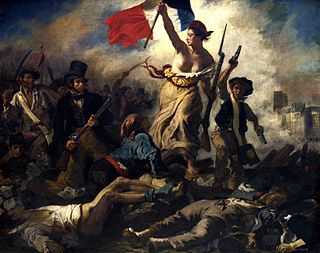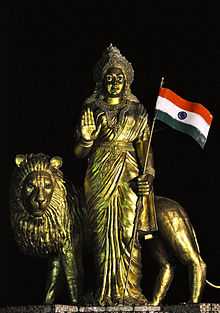Homeland

A homeland (rel. country of origin and native land) is the concept of the place (cultural geography) with which an ethnic group holds a long history and a deep cultural association – the country in which a particular national identity began. As a common noun, it simply connotes the country of one's origin. When used as a proper noun, the word, as well as its equivalents in other languages, often have ethnic nationalist connotations. A homeland may also be referred to as a fatherland, a motherland, or a mother country, depending on the culture and language of the nationality in question.
Motherland

Motherland may refer to a mother country, i.e. the place of one's birth, the place of one's ancestors, the place of origin of an ethnic group or immigrant, or a Metropole in contrast to its colonies. People often refer to Mother Russia as a personification of the Russian nation. India is often personified as Bharat Mata (Mother India), a concept that emerged during British colonial period. The French commonly refer to France as "la mère patrie";[1] Hispanic Americans and 19th century-upper-class Filipinos, commonly refer to Spain as "la Madre Patria", but currently without any ideological meaning.
Fatherland
Fatherland is the nation of one's "fathers" or "forefathers". It can be viewed as a nationalist concept, insofar as it relates to nations.
The term fatherland (Vaterland) is used throughout German-speaking Europe, as well as in Dutch. For example, "Wien Neêrlands Bloed", national anthem of the Netherlands between 1815 and 1932, makes extensive and conspicuous use of the parallel Dutch word.
Because of the use of Vaterland in Nazi-German war propaganda, the term "Fatherland" in English has become associated with domestic British and American anti-Nazi propaganda during World War II. This is not the case in Germany itself, where the word remains used in the usual patriotic contexts.
Terms equating "Fatherland" in other Germanic languages:
- Afrikaans Vaderland
- Danish fædreland
- Dutch vaderland
- Frisian heitelân
- German Vaterland
- Icelandic föðurland
- Norwegian fedreland
- Scots heauinlie (besides the more common faitherland)
- Swedish fäderneslandet (besides the more common fosterlandet)
A corresponding term is often used in Slavic languages, in:
- Serbian otadžbina(отаџбина)
- Macedonian татковина (tatkovina)
- Bulgarian татковина (tatkovina) as well as otechestvo
- Czech otčina (although the normal Czech term for "homeland" is vlast)
- Polish ojczyzna (besides rarer namemacierz "motherland")
- Russian otechestvo (отечество) or otchizna (отчизна) (although rodina "motherland" is more common).
In Italy, and in Hispanic America's countries a common way to refer to one's country is Patria which has the same connotation as Fatherland, that is, the nation of our parents/fathers (From the Latin, Pater, father). Curiously, Spain is commonly referred to in Hispanic countries as la Madre Patria (the Motherland).
Various connotations
- The Soviet Union created homelands for some minorities in the 1920s, including the Volga German ASSR and the Jewish Autonomous Oblast. In the case of the Volga German ASSR, these homelands were later abolished and their inhabitants deported to either Siberia or the Kazakh SSR. In the case of the Jewish Autonomous Oblast this was not necessary, since it had been created from the start at the far-Eastern end of Siberia, where no Jew had ever lived.
- In the United States, the Department of Homeland Security was created soon after the 11 September 2001, terrorist attacks, as a means to centralize response to various threats. In a June 2002 column, Republican consultant and speechwriter Peggy Noonan expressed the hope that the Bush administration would change the name of the department, writing that, "The name Homeland Security grates on a lot of people, understandably. Homeland isn't really an American word, it's not something we used to say or say now".[2]
- In the apartheid era in South Africa, the concept was given a different meaning. The white government had designated approximately 25% of its non-desert territory for black tribal settlement. Whites and other non-blacks were restricted from owning land or settling in those areas. After 1948 they were gradually granted an increasing level of "home-rule". From 1976 several of these regions were granted independence. Four of them were declared independent nations by South Africa, but were unrecognized as independent countries by any other nation besides each other and South Africa. The territories set aside for the African inhabitants were also known as bantustans.
- In Australia, the term refers to relatively small Aboriginal settlements (referred to also as 'Outstations') where people with close kinship ties share lands significant to them for cultural reasons. Many such homelands are found across Western Australia, the Northern Territory and Queensland. The 'homeland movement' gained momentum in the 1970s. It is estimated that homeland numbers range around 500 to 700, with not all homelands being permanently occupied owing to seasonal or cultural reasons.[3]
- In Turkish homeland, especially in the patriotic sense is "ana yurt" (motherland) while "baba ocağı" (father's home) is used for one's hometown and practically means the house of one's parents where s/he grew up. (Note: The Turkish word "ocak" has the double meaning of january and fireplace, like the Spanish "hogar".)
See also
- Diaspora politics
- Homeland security
- Mother tongue
- Separatism
- Secession
References
- ↑ http://www.lexpress.fr/actualite/societe/ces-tirailleurs-senegalais-qui-ont-combattu-pour-la-france_906248.html
- ↑ Noonan, Peggy (14 June 2002). "OpinionJournal – Peggy Noonan". Retrieved 8 September 2007.
- ↑ "The Encyclopedia of Aboriginal Australia". 1994.
Further reading
- Landscape and Memory by Simon Schama (Random House, 1995)